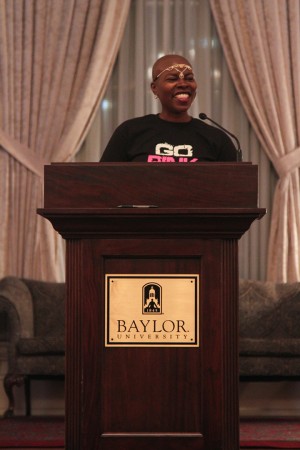
Reporter
Approximately one in eight women in the United States will contract breast cancer sometime in their lifetime, according to the National Cancer Institute.
Two Baylor alumnae, Markell Davidson Ford and Bianca Hunter, spoke about their fights against breast cancer Monday in an event titled “Go Pink,” presented by the Waco Alumnae Chapter of Delta Sigma Theta Sorority Inc.
Ford and Hunter quickly became friends at Baylor more than 15 years ago, after meeting in North Russell Residence Hall. The two share much in common. Both women pledged to Delta Sigma Theta, have become mentors and educators and fought against breast cancer.
Hunter said her doctor had encouraged her to get a mammogram in 1995. She debated on getting one, but put it off at first amid concerns that her insurance wouldn’t cover it before she was 40 years old. However, something happened to her in 2013, at the age of 35.
“I felt a dull pain in my right breast,” Hunter said. “Normally, I would have put it off, but my husband urged me to get it checked out.”
When doctors told her she had two suspicious lumps, Hunter said she felt like she had her breath knocked out of her. She thought about how it would affect her family. Hunter said she had never expected she could contract breast cancer, because her family had no history of it.
Hunter began getting treatment including chemotherapy, and she said within a week she changed from looking healthy to looking like a cancer patient.
“I was no sicker,” Hunter said. “But people began to notice the physical manifestations.”
Ford had a different experience with cancer than Hunter. Before contracting breast cancer, Ford had been previously cured of Hodgkin’s disease, a cancer of the lymph nodes.
“I was 21 years cured,” Ford said. “This year, I was diagnosed with triple negative breast cancer.”
Shenequa Williams, a representative of Susan G. Komen, the nonprofit organization fighting breast cancer, said everyone should check and test for breast cancer, especially if one has a family history. Williams checks herself regularly, and her mother fought against breast cancer as well. Williams said she had a scare two years ago when she thought she might have had a tumor, which turned out to be only a cyst.
“Early detection is key,” Williams said. “Never ignore it.”
Williams said African Americans and Hispanics experience a higher mortality rate with breast cancer than other groups, usually because the disease is not detected earlier.
“Events like this are important so everyone can become aware, and people can educate themselves and their family,” Williams said.
Williams said women should get mammograms once every three years after age 20 and once every year after age 40. Mammograms can detect potentially cancerous tumors about the size of a dime. Lumps are sometimes found by accident when they are not actively looked for, but by this time they are already the size of a quarter.
Ford said her story is not over and there are still uncertainties in the future. Ford is scheduled for a mastectomy next month, but she is certain of one thing.
“I know how my story ends–I win,” Ford said.





